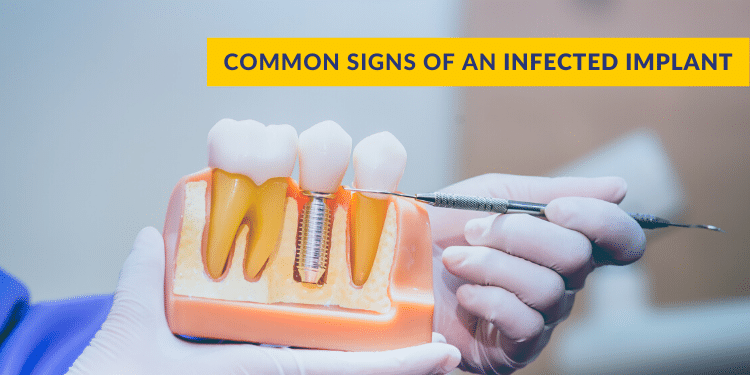- +917892951808
- Indiranagar, Bangalore
Best Dental Clinic In Bangalore Indiranagar | Best Dentist in Bangalore Indiranagar
- Home
- About Us
- Treatments
- Blog
- Contact Us
Common signs of an infected implant

Dental implants work exactly like natural teeth, which means they can get infected by poor oral care. When the gums and bone structure around the implant gets infected, it forms a disease called peri-implantitis. It's caused due to bacteria present in the mouth. If left untreated, it causes inflammation, bone loss, and implant failure. The infection can start soon after your dental implant surgery or after a few years. Moreover, low-quality dental implants can put you at a higher risk of developing an oral infection.
Here are some warning signs of an infected implant:
Pain and Fever
You usually experience pain after the implant surgery, it's a sign that you are healing. It lasts for a couple of days and then slowly reduces on its own. However, if you experience persistent pain in your implant after a long time, it could mean you have an infection. Pain in the implant after a bite of food could also indicate that your tooth is at risk. Bacteria from the infection will lower the body's immunity. A low immune system can cause fever.
- Swollen gums Swollen gums are a common sign associated with oral infection. Inflammation and red gums can be a sign of peri-implantitis. An untreated oral infection can spread to other areas in the mouth, thus causing more health problems.
- Loose Implant If you sense that your implant is loose, visit the dentist immediately. A wobbly implant could be because of bone loss or some bacterial infection. Quick treatment can save you from further damage to the jawbone.
- Puss & bleeding If you notice pus or bleeding in the gums, the implant is likely to be infected. Your gums can also bleed while brushing. Bleeding can be a sign of gingivitis or inflammation.
- Trouble chewing The patients that do not use titanium implants may have trouble chewing their food. Titanium implants help you to chew easily as they naturally fuse with the bone structure.
- Chronic bad breath and unpleasant taste
- Low immune system
- Diabetes
- Smoking
- Improper Oral Hygiene
- An improper fixture of the implant
- Low bone density
- In a rare case, the implant does not fuse with the bone.
